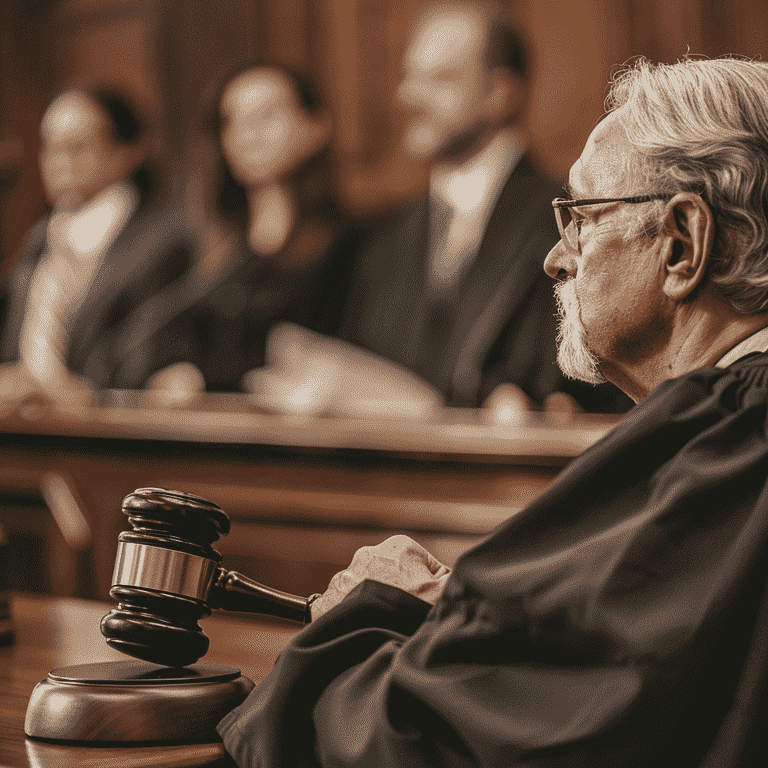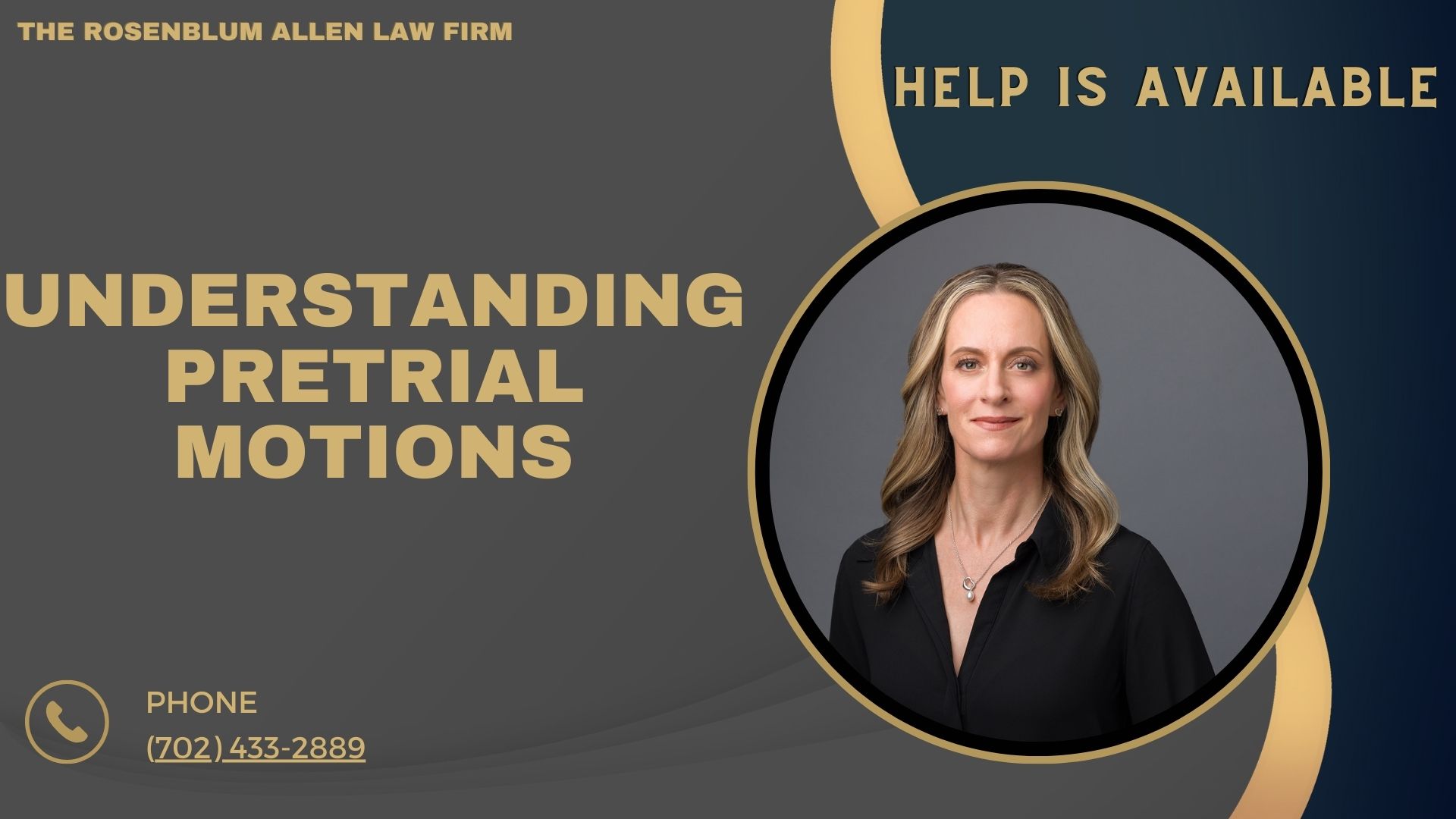Pretrial motions are vital in the judicial system. They let both parties set the bounds of their legal battle before entering court. These motions streamline the trial. They resolve specific issues beforehand. This can save time and resources.
Note: Make sure to also check out our Signs Your Case Will Be Dismissed in Las Vegas post while you’re here.
 Definition and Purpose of Pretrial Motions
Definition and Purpose of Pretrial Motions
A defendant or plaintiff makes pretrial motions to the court. They do so before the trial starts. These motions ask the court to decide on specific legal or procedural issues. The issues will affect how the trial goes. The main aim is to set up the legal playing field. This ensures all parties have a fair chance to present their case.
Importance in the Judicial Process
Pretrial motions play a pivotal role in shaping the course of a trial. They can pick what evidence to show. They set the trial’s structure. They decide if the case will go to trial. For example, a successful motion to dismiss can end a case. It can be based on procedural errors or substantive grounds. It can do so before the case even reaches the trial phase.

Types of Pretrial Motions
Pretrial motions can be diverse. Each serves a specific function in the law. Understanding these can significantly influence a legal case’s strategy.
Motion to Dismiss
A Motion to Dismiss is filed to ask the court to dismiss a case for specific reasons. These can include a lack of legal basis to proceed. They can also involve jurisdiction or statute limits.
Grounds for Filing a Motion to Dismiss
Lack of Jurisdiction: The court needs the authority to hear the case.
Failure to State a Claim: The complaint does not allege enough legal wrongdoing to warrant a trial.
Statute of Limitations: The time limit for filing the lawsuit has expired.
Motion for Summary Judgment
This motion asks the court to rule on the case without a trial. It is based on evidence showing no factual dispute.
Criteria for Granting Summary Judgment
No Genuine Dispute: All parties agree on the facts, leaving only the legal issues to be resolved by the court.
Clear Evidence: The evidence overwhelmingly favors one side’s claim or defense.
Motion to Suppress Evidence
A Motion to Suppress aims to block evidence that was improperly obtained. It ensures a fair trial process.
Basis for Excluding Evidence
Violation of Rights: Evidence obtained through methods violating constitutional rights, like illegal searches.
Irrelevance or Prejudice: Evidence not relevant to the case or that might unfairly prejudice the jury.
Other Common Pretrial Motions
Other motions may address more specific needs within the pretrial process.
Motions in Limine
They ask the court to ban some evidence from the trial. The evidence cannot be mentioned or seen unless the court allows it.
Motion for Change of Venue
She filed a request to move the trial. This was due to concerns about a biased jury pool or convenience for all parties.
Each pretrial motion addresses different parts of legal prep and strategy. They set the stage for how a trial will unfold. Understanding and using these moves well can greatly affect legal proceedings.

Filing Pretrial Motions
Filing pretrial motions correctly is crucial. It directly shapes how the case is managed and its outcome. Knowing who can file them, when, and what documentation is needed can ensure the process goes smoothly.
Who Can File and When
Pretrial motions can be filed by either party in a lawsuit—the plaintiff or the defendant. But, strict legal deadlines govern the timing of these motions. The deadlines can vary based on the court’s rules and the case’s nature.
Timing and Deadlines for Filing
Before the Pretrial Conference: Most motions must be filed before the pretrial conference to allow the court time to consider the arguments.
Deadlines Specified by Court Rules: Each jurisdiction has specific deadlines for various motions. Always check local court rules.
Required Documentation
Proper documentation is critical to the success of a pretrial motion. This often includes a written motion, supporting legal arguments, and sometimes evidence.
Necessary Forms and Supporting Documents
Motion Form: Typically starts with a standard form or template that outlines the request.
Supporting Brief: Detailed legal arguments supporting the motion.
Evidence: Documents, declarations, or other evidence supporting the motion’s claims.

Responding to Pretrial Motions
Responding to pretrial motions is as critical as filing them. The response can significantly influence the court’s decision on the motion.
How to Respond Effectively
To craft an effective response, you need to clearly understand the opposing party’s legal arguments and evidence.
Strategies for Opposing a Motion
Counterarguments: Develop strong legal rebuttals to the points raised in the motion.
Supplementary Evidence: Provide evidence supporting your position and counter the opponent’s claims.
Possible Outcomes of a Response
The response to a pretrial motion can lead to various outcomes. Each one affects the case’s direction.
What Happens if a Motion is Granted or Denied
Motion Granted: The court agrees with the motion, which might result in evidence being excluded, a case being dismissed, etc.
Motion Denied: The case continues as planned, or the specific request made in the motion is not honored.

Legal Considerations and Strategies
Navigating pretrial motions requires understanding the law and case strategy.
Legal Standards Applied to Pretrial Motions
Judges use specific legal standards to judge pretrial motions. They focus on legal precedent and the evidence.
How Judges Evaluate Motions
Legal Precedent: Judges often refer to previous similar cases to guide their decisions.
Evidence Quality: The presented evidence’s credibility, relevance, and weight are scrutinized.
Strategic Use of Pretrial Motions in a Case
Using pretrial motions strategically can shape the trial’s scope and outcome.
Timing and Tactical Considerations
Early Motions: This can be used to test the opponent’s case’s strength or push for an early dismissal.
Later Motions: Might target weaknesses in evidence revealed through discovery.
This guide segment offers a full look at how pretrial motions are filed and responded to. It also covers the strategy that guides these legal moves. Understanding these parts is key for anyone in legal proceedings. They set the groundwork for the trial and can greatly change its course.

Impact of Pretrial Motions on a Case
Pretrial motions can greatly change a legal battle. They might decide the outcome before the trial starts.
Potential to Resolve a Case Early
Pretrial motions have a big impact. They can resolve a case before it goes to trial.
How Pretrial Motions Can Lead to Settlements or Dismissals
Dismissal: A motion to dismiss that is granted can end a case without a trial, often based on procedural grounds or insufficiency of the claim.
Settlement Encouragement: The strength or weakness revealed through motions can push parties towards settling to avoid the uncertainties of trial.
Influencing the Course of a Trial
The decisions made on pretrial motions can set the tone for the courtroom. They influence the trial’s strategy and proceedings.
Preparing for Different Trial Scenarios Based on Motion Outcomes
Evidence Management: Decisions on motions to suppress can limit the evidence available, affecting trial strategies.
Witness Testimonies: Motions in limine can determine which witness testimonies are permissible, guiding legal approaches and preparation.

Pretrial Motions in Different Courts
Understanding pretrial motions in different court systems is essential for lawyers and those in legal disputes.
Federal vs. State Court Considerations
The rules and procedures for pretrial motions can differ significantly between federal and state courts, affecting how motions must be prepared and argued.
Variations in Motion Procedures and Rules
Federal Courts Often have more standardized rules and stricter deadlines.
State Courts: Rules can vary widely between states, sometimes offering more flexibility in procedural matters.
Notable Differences in Criminal vs. Civil Cases
Pretrial motions in criminal and civil contexts serve similar purposes but operate under different stakes and standards.
Specific Challenges and Approaches in Each Area
Criminal Cases: Focus heavily on rights protection, such as motions to suppress evidence obtained unlawfully.
Civil Cases often involve the adjudication of rights and responsibilities, such as summary judgments based on contract disputes.

Breaking It All Down
Pretrial motions are critical. They shape the dynamics and potential outcomes of litigation. They are a tool for defense and prosecution. They limit the issues at trial. They manage legal risks and resolve disputes without full trials. Understanding pretrial motions is key for legal pros and anyone in court. They must use them well.
Importance of Legal Counsel
Navigating pretrial motions with skilled legal counsel can be easy.
How an Attorney Can Aid in Pretrial Proceedings
Effective Guidance: Attorneys can provide crucial advice on when and how to file or respond to motions.
Strategic Planning: Legal professionals help craft a strategy that uses pretrial motions to position the case advantageously from the start.
This detailed guide shows the importance of pretrial motions in legal proceedings. It is for those seeking to understand or take part in this key stage of litigation.

Frequently Asked Questions
Q: What are the advantages of filing for divorce first?
Filing first can offer strategic advantages. These include choosing the court. It can also affect the pace of proceedings. It also lets you prepare financially and emotionally before the other party responds.
Q: How does the choice of jurisdiction affect my divorce case?
The divorce case’s filed location affects the applied laws. This is especially true for asset division, custody, and spousal support. Filing first allows you to choose a familiar or more favorable jurisdiction.
Q: Can filing for divorce first impact custody decisions?
Filing first doesn’t directly impact custody outcomes. But, it can give you more time to prepare your arguments and evidence. This will help you present a stronger case for your preferred custody arrangement.
Q: What should I consider before deciding to file for divorce?
Consider your finances. Think about the impact on children. Also, think about the legal strategies you might use and your emotional readiness. It’s wise to consult a lawyer to understand your situation’s legal implications.
Q: How can filing for divorce affect my financial situation?
A: Filing for divorce initiates the process of asset and debt division. It might also involve determining interim financial support. Preparing in advance can help you protect your financial interests during proceedings.

Additional Resources for You
We also remind our readers that Molly Rosenblum Allen, Esq., our lead attorney at The Rosenblum Allen Law Firm, has developed a variety of legal resources that can assist you in other challenging times. Below are links to additional services provided by our firm:
- Criminal Defense Attorneys– Effective legal defense for a wide range of criminal charges.
- Las Vegas DUI Lawyer – Dedicated support for DUI charges, ensuring your rights are protected.
- Domestic Violence Lawyer Las Vegas – Compassionate and robust defense for domestic violence allegations.
- Drug Possession Lawyer – Defense strategies for drug possession charges, focusing on reducing penalties.
- Sex Crimes Attorney – Specialized defense for those accused of sex-related offenses.
- CPS Defense Attorney – Legal representation for cases involving child protective services.
- Misdemeanor Lawyer – Legal advice and representation for misdemeanor charges.
- Las Vegas Warrant Defense Attorney – Assistance in resolving outstanding warrants and related legal issues.
- Las Vegas Probation Violation Attorney – Representation for probation violation matters to mitigate potential consequences.
- Theft Crime Defense Lawyer – Defense services for theft and property crime charges.
- Kidnapping Lawyers – Effective defense for kidnapping charges, focusing on case dismissal or reduction.
- Juvenile Defense Lawyers – Specialized legal representation for juveniles facing criminal charges.
- Firearms Lawyer Las Vegas – Legal support for firearms-related charges in Las Vegas.
Each link leads to a dedicated resource page where you can find detailed information and support for these specific legal issues.

Outside Resources for You
American Bar Association – Provides resources on understanding your legal issues, finding a lawyer, and articles on family law.
FindLaw – Offers a comprehensive range of legal information, including detailed sections on family law and divorce.
Avvo – Features legal guides and a directory of lawyers where you can ask questions and receive answers from attorneys.
Justia – Provides free case law, codes, regulations, and legal information for lawyers, business, students, and consumers.
National Association of Criminal Defense Lawyers (NACDL) – For those who require resources related to criminal defense, this site offers extensive support and advocacy information.
Nolo – Offers in-depth legal articles, many of which are focused on family law, divorce, and the processes involved.
Rocket Lawyer – Provides legal documents and advice, including family law documents that you can create and customize.

A Special Message from Our Lead Attorney, Molly Rosenblum Allen, Esq

Thank you for taking the time to review our resources. I hope you found them informative and helpful for understanding your legal options. If you’re ready to discuss your situation further and see how my team and I can assist you, please don’t hesitate to call us at (702) 433-2889. We’re here to help you get the ball rolling on your case.
Best regards, Molly Rosenblum Allen, Esq. The Rosenblum Allen Law Firm



